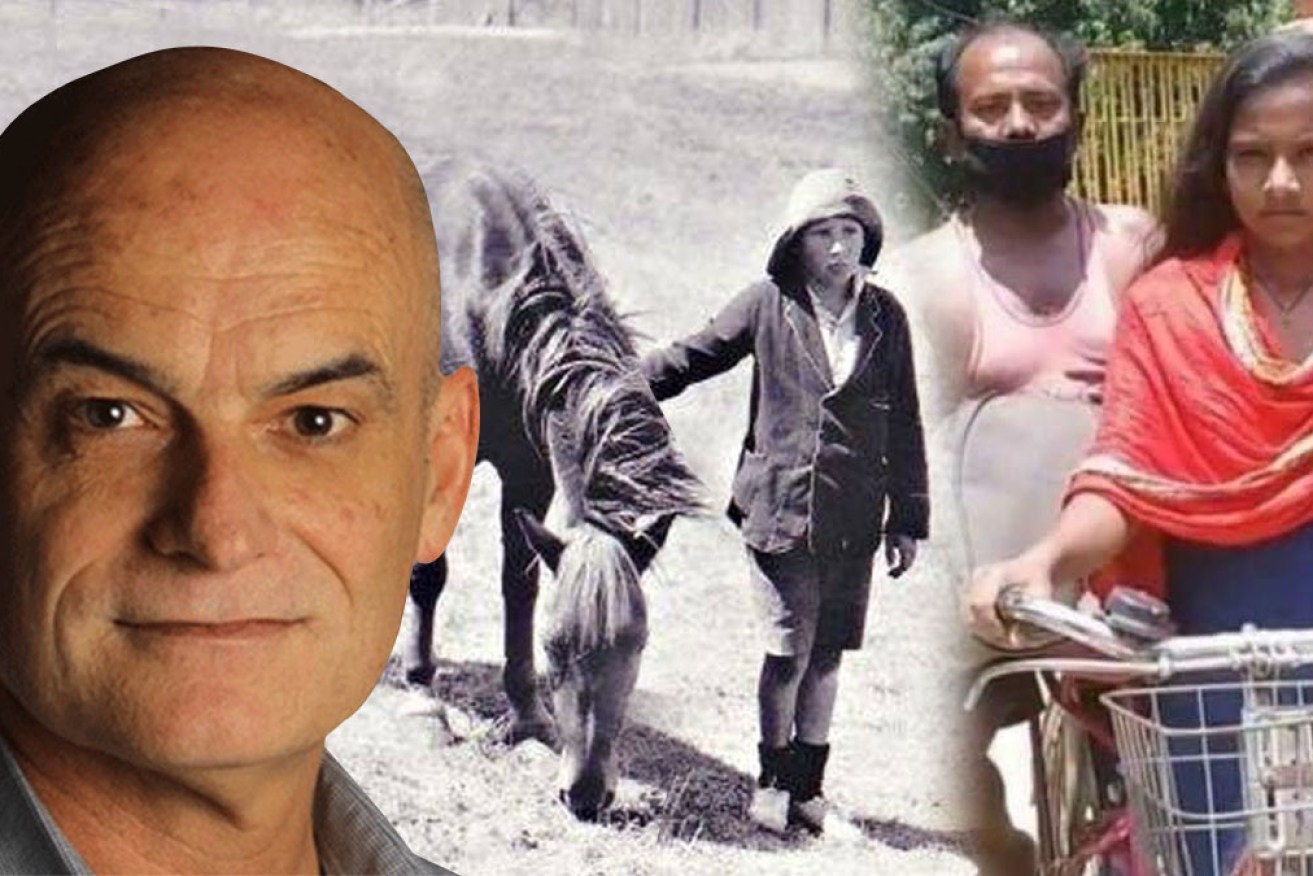Garry Linnell: The greatest story you’ve probably never heard


Garry Linnell says we need to remember the good stories amid the chaos. Photo: TND
So you missed one of the most uplifting stories of the coronavirus pandemic?
Maybe you just forgot about it.
Brief tales of hope are easily lost in the daily barrage of body bags, burning cop cars and jobless queues stretching for blocks.
Still, this one is worth remembering.
And while it played out on the crowded and dusty roads of India, it
echoes a similarly inspiring journey that unfolded on a series of
lonely Australian bush tracks during another bleak and difficult era.
But first, picture a crowded, run-down suburb of New Delhi.
In the sweltering heat, an injured rickshaw driver lies on a makeshift bed, unable to walk – or work.
Facing eviction because he cannot pay the rent, the man’s 15-year-old
daughter uses the last of their money to buy an old red bike.
She props her disabled father on the back of the bicycle and begins pedalling.
And keeps pedalling.
The roads are choked with thousands of migrant workers forced to
return home to their rural villages after being left jobless by the
pandemic.
But in this grim landscape, kindness flourishes.
Strangers provide the father and daughter with food, water and shelter.
For almost two weeks Jyoti Kumari pedals furiously down these chaotic
roads, through grimy slums and along rutted tracks.
Finally, after a ride of 1200 kilometres, she returns her father safely to the rest of their family in Darbhanga, their village in the state of Bihar.
Tweet from @BBCWorld
Jyoti’s epic journey of hope and determination captivated millions.
But the world’s attention span is short these days and now, barely a
week later, the tale of a daughter’s dogged devotion to her father has
been quickly consumed by the searing bonfire of bad news that engulfs
us.
How easily we forget.
If Jyoti’s ride has already slipped from our minds, then it’s no
wonder the remarkable journey of nine-year-old Lennie Gwyther has been long forgotten.
So picture this.
It’s 1932 and Australia is in the grip of the Great Depression.
One in three workers are unemployed.
Decrepit shanty towns hug the outskirts of the big cities.
A scrawny rabbit caught in a trap will feed a family for a week.
Country roads are filled with broken men walking from one farmhouse to
another seeking menial jobs and food.
On the outskirts of the South Gippsland town of Leongatha, an injured
farmer lies in bed unable to walk – or work.
World War I hero Captain Leo Tennyson Gwyther is in hospital with a
broken leg and the family farm is in danger of falling into ruins.
Up steps his son, nine-year-old Lennie.

Lennie Gwyther and Ginger Mick. Photo: Leongatha Chamber Of Commerce
With the help of his pony Ginger Mick, Lennie ploughs the farm’s 24 paddocks and keeps the place running until his father can get back on his feet.
How to reward him?
Lennie has been obsessively following one of the biggest engineering feats of the era – the construction of the Sydney Harbour Bridge.
He wants to attend its opening.
With great reluctance, his parents agree he can go.
So Lennie saddles up Ginger Mick, packs a toothbrush, pyjamas, spare clothes and a water bottle into a sack, and begins the 1000-kilometre trek to Sydney.
Alone.
That’s right.
A nine-year-old boy riding a pony from the deep south of Victoria to the biggest and roughest city in the nation.
Told you it was a different era.
No social media.
No mobile phones.
But even then it doesn’t take long before word begins to spread about a boy, his horse and their epic trek.
The entire population of small country towns gather on their outskirts
to welcome his arrival.
He survives bushfires, is attacked by a “vagabond” and endures rain
and cold, biting winds.
When he reaches Canberra he is welcomed by Prime Minister Joseph
Lyons, who invites him into Parliament House for tea.
When he finally arrives in Sydney, more than 10,000 people line the
streets to greet him.
He is besieged by autograph hunters.
He becomes a key part of the official parade at the bridge’s opening.
He and Ginger Mick are invited to make a starring appearance at the Royal Show.
Even Donald Bradman, the biggest celebrity of the Depression era,
requests a meeting and gives him a signed cricket bat.
A letter writer to The Sydney Morning Herald at the time gushes that
“just such an example as provided by a child of nine summers, Lennie
Gwyther was, and is, needed to raise the spirit of our people and to
fire our youth and others to do things – not to talk only.
“The sturdy pioneer spirit is not dead … let it be remembered that this
little lad, when his father was in hospital, cultivated the farm – a
mere child.”
When Lennie leaves Sydney for home a month later, he has become one of the most famous figures in a country craving uplifting news.
Large crowds wave handkerchiefs.
Women weep and shout “goodbye”.
According to The Sun newspaper, “Lennie, being a casual Australian,
swung into the saddle and called ‘Toodleloo!’”.
He finally arrives home to a tumultuous reaction in Leongatha.
He returns to school and soon life for Lennie – and the country – returns
to normal.
These days you can find a bronze statue in Leongatha commemorating
Lennie and Ginger Mick.
But Australia has largely forgotten his remarkable feat – and how he inspired a struggling nation.
Never taught about him in school?
Never heard of him before?
Spread the word.
We need to remember – and celebrate – Lennie Gwyther and Jyoti Kumari and their courageous journeys.
They’re great stories.
God knows we need them now, more than ever.
Garry Linnell was director of news and current affairs for the Nine network in the mid-2000s. He has also been editorial director for Fairfax and is a former editor of The Daily Telegraph and The Bulletin magazine








